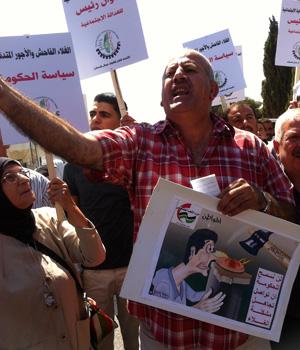Amid rising costs, West Bank residents protest against Palestinian Authority
Palestinians demonstrate outside the prime minister’s office on Tuesday, calling for his resignation because of rising living costs. (Photo by Matthew Bell.)
The Palestinian Authority announced measures Tuesday to calm down street protests.
For nearly a week, demonstrators across the West Bank have vented their frustrations at the rising cost of living at the Palestinian leadership.
In contrast to a few few nights ago, when dozens of protesters in the Amari Refugee Camp blocked the main road, set tires on fire and chanted against Palestinian leaders, things were quiet Tuesday. But the frustration was still there.
Vegetable dealer Mujahed Yassin delivered a truckload of tomatoes, cauliflower and eggplant to a small produce shop. The price of tomatoes, he said, has almost tripled in six weeks.
“The prices for water and fertilizer have gone up,” Yassin said. “Farmers are being hit hard. So, they prefer to sell to Israel” — where people make a lot more money.
That drives prices in the West Bank up further.
“People here (in the West Bank) just aren’t buying like they used to,” Yassin said.
The man getting much of the blame is Palestinian Prime Minister Salam Fayyad.
A mile or so up the hills from the refugee camp, a few hundred protesters gathered outside the prime minister’s office late Tuesday morning. Among them, lots of employees of the Palestinian Authority — the biggest employer in the West Bank by far. Ghadeer Oudeh, who works at the Ministry of Labor, said she hasn’t been paid in six weeks.
“I live with my my mother and my sister,” Oudeh said. “I support them. And therefore, I’m constantly worried about having money to be able to put food on the table. It’s an extremely difficult situation for me.”
Oudeh went on to blame the Israeli occupation for the West Bank’s economic troubles. But she said, the Palestinian leadership is failing to makes things better.
The demonstration outside the prime minister’s office dispersed peacefully, but Fayyad wasn’t taking any chances.
Fayyad said a recent fuel price hike would be cancelled and sales taxes will be reduced. Civil servants will start getting paid this week, he said, and high-level government officials will take a pay cut.
But what these moves do not address are the more fundamental challenges for the West Bank economy.
The Palestinian Authority is heavily dependent on foreign aid. The United States, European Union and Arab states have not delivered some $500 million in promised funding. That has created a budget shortfall and pushed the authority further into debt.
Overall unemployment in the West Bank stands at about 20 percent. It’s even higher for young people.
The Palestinian economy is also dependent on Israel. Palestinian tax rates are tied to the much-stronger Israeli economy. And the Israelis — not the Palestinian Authority — have control over the West Bank’s borders, most natural resources and tax collections from import and export duties.
In recent days, demonstrators have called on the Palestinian leadership to renegotiate past economic agreements with Israel.
Back at the Amari refugee camp, Katry said he’s got a better idea.
“All these people running the Palestinian Authority should go,” he said. “They are not helping the public. When Israel was in complete control of the West Bank, times were better. People had jobs and more money.”
